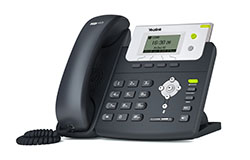Hosted VoIP for Business: Why It’s the Right Choice
Choosing hosted VoIP for business can be overwhelming. So many options exist, but the competitive industry provides you with an advantage: getting the biggest bang for your buck. While cost is a high priority, it isn’t the only priority for most business owners. If you’re like all of Astoundant’s customers, you rely on your phones to help with running your business.
How Hosted VoIP for Business Works
For those who aren’t sure how hosted VoIP works, read on. For those already familiar with the technology, feel free to skip this section.
Hosted VoIP for business looks and acts much like traditional analog service. Take a desk phone, plug it into a wall jack, and get dial tone. Behind the curtain, though, contains the real magic.
Instead of analog phone lines, Hosted VoIP uses the Internet for calls. Instead of an analog phone, Hosted VoIP typically uses an Internet phone that is connected to the business’ Internet router, like a desktop computer. Most phones require a CAT 5 cable, but some can connect to the business’ WiFi connection.
Many businesses have several phones, typically one for each employee. An analog phone system with several phones typically uses a Centrex system — an antiquated, very expensive system with an on-premises controller that provides multi-line functions, music on hold, and call transfer.
However, businesses are replacing old Centrex systems with hybrid VoIP/analog systems. The on-premises equipment provides the same functionality of Centrex, and is still very expensive. These hybrid systems can be configured in different ways, but still relies on antiquated analog lines.
Comparatively speaking, hosted VoIP for business sends and receives calls through the same Internet service used for web browsing and email without any additional on-premise equipment. Not needing to purchase and maintain equipment leads to huge cost savings.
How Much Do Businesses Save with Hosted VoIP for Business?
The cost savings can range anywhere from 30% – 80% compared to traditional analog service or hybrid analog/VoIP service. Businesses don’t have to purchase a Centrex controller or hybrid equipment. They also don’t have to run extra analog lines or install a T1.
The cost savings also includes the monthly bill. Since hosted VoIP for business sends and receives calls through the Internet, businesses only have to ensure they have enough bandwidth to handle the call traffic. In most cases, it’s less expensive to increase Internet bandwidth than it is to add analog lines.
Most hosted VoIP providers do not charge per minute for local and long distance calls. For instance, Astoundant charges a monthly flat rate for all calls made in North America. On the other hand, traditional analog providers still charge per minute for local and long distance calls.
What About Bundled Phone Service with Internet?
Many Internet providers now bundle business phone service with Internet. The initial monthly service cost is the same or less than hosted VoIP for business. But the providers only provide two or three features, and charge extra for features like call transfer, music on hold, and voicemail.
Astoundant includes 40 features at no extra charge. Our service includes everything a business needs, like voicemail for every user, music on hold, and voicemail messages transcripted to text and sent by email.
And What About Reliability?
Prospective customers always ask us things like:
“What if my Internet goes down?”
“Will Internet use affect call quality?”
These are legitimate concerns!
It’s a little-known fact that all calls now route through the Internet at some point — mobile phone calls, analog calls, and VoIP calls. So, reliability concerns more center around the customer’s Internet.
Hosted VoIP for business requires Internet reliability and speed to work well. Unfortunately, not all areas have reliable and fast Internet. Satellite or outdoor WiFi Internet tend to not work well with VoIP.
Fortunately, the majority of US businesses have reliable, high speed Internet, so they can use VoIP. To be sure, many of the Internet speed tools available will help determine if your Internet can use VoIP. Since VoIP sends and receives sound packets, if you can stream music on your company’s Internet connection reliably, odds are you can use VoIP.
Unless your business has very little bandwidth, heavy Internet use won’t affect VoIP much. VoIP sound packets are relatively small, so employees streaming videos or videoconferencing won’t impact incoming calls.
If you’re considering switching your business’ phone service, now is the perfect time to do so. Astoundant offers a free trial. For a limited time, get 30 days of free phone service.
